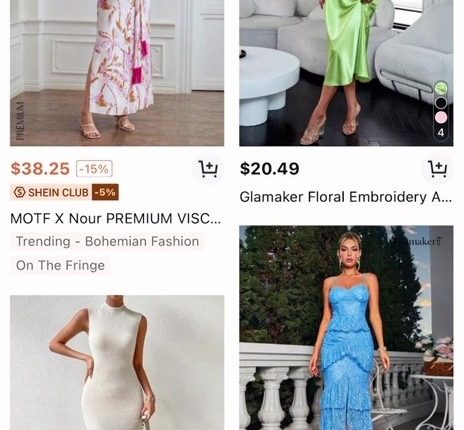SHEIN has risen to online fashion fame thanks to its questionably low prices and the flaunting of ‘cheap but cheerful’ hauls on social media.
The company was valued at $66billion earlier this year, dwarfing that of popular high street brands Zara and H&M.
But you don’t see brick and mortar stores like you do it’s rivals – so, is it legit?
What is Shein?
Shein is an online-only fast-fashion retailer, based out of China, that has become a number one shopping destination for many around the world.
This is due mostly to its incredibly low prices – with clothes typically under £10 – and an impressive ability to follow what’s known as ‘micro trends’.
Micro trends are big fashion styles that are incredibly short-lived, seemingly flying by at the speed of sound, which tend not to re-circulate.
READ MORE ON SHEIN
With this combination – and its mammoth social media and digital marketing presence – the Chinese company has quickly become the world’s largest online fashion retailer, shipping to over 220 globally.
When was Shein created?
The fashion retailer was founded in late 2008, by entrepreneur and marketing specialist Xu Yangtian, also known as Chris Xu.
Very little is known about Shein’s mysterious billionaire founder, but he is among China’s richest men now the retailer is so popular among young shoppers.
Even if you haven’t bought an item from Shein, downloaded the app or even visited the website, you have likely already seen pillars of adverts on your browser.
Most read in Tech
Is Shein a legitimate website?
Yes – in large parts, the Shein dream is not too good to be true.
It’s not a phishing scam.
But you may receive a disappointing order or run into shipping issues if you order from the site, according to reviews.
There have been swathes of quality complaints, which makes sense when looking at the price tag.
Clothes not fitting properly, breaking or tearing after the first wear and being see through are all common complaints.
There may also be an ethical trade-off too, which bursts Shein’s bubble somewhat.
Why is Shein so cheap?
There are a few reasons behind Shein being so cheap.
Firstly, the company has few overheads costs since they sell directly to consumers online.
Shein’s marketing strategy is also predominantly spearheaded by mid-tier influencers, which is a lot cheaper than running traditional ad campaigns.
Meanwhile, the company isn’t thought to spend much on a design team as it has racked up a number of lawsuits and accusations over stolen designs.
Complaints regarding quality and cheap materials go hand-in-hand.
Most of Shein’s clothing is made of cheap virgin plastic materials like polyester, nylon, and other synthetic fabrics – which is why they can fall apart so quickly.
These fabrics can also take 20 to 200 years to decompose.
And with cheap materials and prices, come allegations from US Congress that Shein uses a trade loophole known as de minimis, where no tariffs are placed on packages under $800.
The company also subcontracts its production to lots of different outsourced companies, on the basis of who can fulfil their order the quickest and cheapest.
Shein has fielded a number complaints over its exploitation of workers as a way to offer unrealistically low prices.
Workers in China were found to be working 75 hour weeks and only one day off a month to keep Shein’s fast-fashion production alive and kicking in 2021.
Supply staff were also found to be paid just £16.50 for a 17 hour day.
But in 2022, Shein said it forced its suppliers to stop this practice, and has since toured influencers around its factories in an effort to scrub up its ethical image.
Shein has also faced allegations that its clothes are made with the forced labour of Chinese Uyghurs, an oppressed minority group.
Between June 2022 and the beginning of this year, Shein says it found that nearly 98 per cent of its cotton did not come from Xinjiang.
READ MORE SUN STORIES
Bur 2.1 per cent was found to be sourced from the northwest Chinese region.
“In all such [positive] cases, production of affected products was stopped and any products containing cotton associated with the positive tests were removed for sale,” a spokesperson said in June 2023.
Best Phone and Gadget tips and hacks

Looking for tips and hacks for your phone? Want to find those secret features within social media apps? We have you covered…
We pay for your stories! Do you have a story for The Sun Online Tech & Science team? Email us at [email protected]










